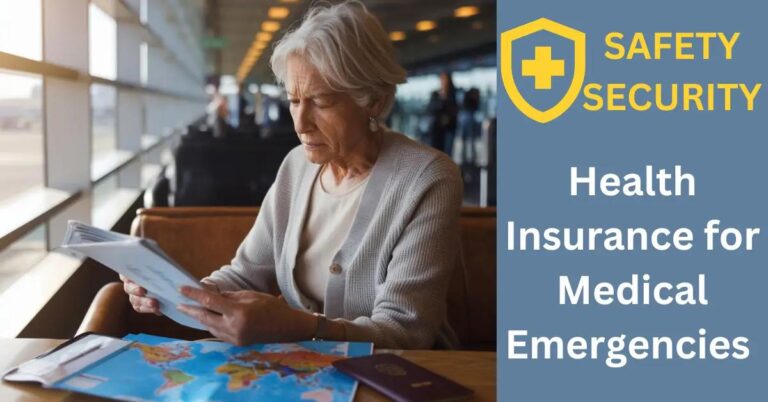TL;DR:
- Check international medical standards and patient safety protocols; regulations differ by country.
- Be culturally competent for effective communication and to avoid misunderstandings in healthcare abroad.
- Watch for healthcare fraud; verify providers beforehand.
- Ensure healthcare accessibility by researching local facilities and having emergency plans.
- Travel health insurance covers sudden medical costs; understand your insurance’s coverage and claims process.
- Compare expatriate insurance plans for proper emergency and regular care coverage.
- Know emergency procedures, medical evacuation options, and local emergency numbers.
- Prepare for medical emergencies by having a first-aid kit and list of local hospitals.
- Stay informed on required vaccinations and travel health advisories, and consult a doctor pre-travel.
- Carry necessary medications and a simple medical history record while traveling.
Heading abroad can be thrilling, but healthcare safety and security are vital concerns. As expatriates, understanding the measures to protect yourself is essential. From navigating international medical standards to exploring patient safety protocols, each step ensures peace of mind. You need to know how to prevent healthcare fraud and recognize accessibility challenges. With the right knowledge, you can enjoy your adventure abroad while staying secure and healthy. Let's dive into healthcare essentials every global nomad must know!
What Are the Essential Safety Measures for Healthcare Abroad?
When traveling, knowing the safety risks is key. Understanding healthcare abroad safety measures can help you stay safe. First, ask yourself: What safety and security risks exist when traveling? The answer depends on the destination, but knowing international medical standards helps. These standards keep healthcare quality in check.
Patient safety protocols overseas are vital, too. Ask this: What are the healthcare safety and security abroad requirements? Regulations differ by country. Check local health guidelines before you go.
Now, let’s talk about cultural competence in healthcare. Why is it important? It promotes clear communication with medical staff. Understanding cultural norms can prevent misunderstandings. It also leads to respectful care and helps doctors respond to your needs better.
Next, be aware of healthcare fraud prevention internationally. Fraudsters can target travelers. Know fraud signs and verify healthcare providers before getting treatment. This step ensures that your healthcare is both safe and honest.
Finally, think about how healthcare accessibility impacts your trip. It varies worldwide. Research local medical facilities and have a plan in case of emergencies. Find out if hospitals or clinics meet your needs, especially if you have ongoing treatments.
In summary, protect your health and security by learning about these key areas before traveling. Use knowledge as your main tool to stay safe.
How Can Travel Health Insurance Safeguard Your Trip?
When traveling abroad, the safety of your health is key. This safety starts with travel health insurance. Is it safe to travel abroad? Yes, if you have the right coverage. Comprehensive health insurance helps manage risks. It covers sudden medical costs that might occur far from home. This coverage lets you travel with peace of mind.
Understanding insurance while abroad is crucial. The insurance claims process can be tricky. To start, make sure to have all required documents and receipts. Check what your insurance covers before you need to claim. Knowing your coverage streamlines claims and reduces stress.
Choosing health insurance when overseas involves considering options. Expatriate health insurance can vary. Research tells you which plans suit long stays. Compare different plans to find one that fits your needs. Ensure you have coverage for emergencies and regular care.
You should also know the differences between public and private healthcare abroad. Public systems may be cheaper or free but can lack speed. Private healthcare often provides faster service at higher costs. Make sure your insurance covers private care if you prefer it.
Consider risks linked to medical travel. Accidents or sudden illnesses happen. Insurance reduces the impact of these events. Knowing the risks prepares you to handle them better.
Additionally, understand the concept of medical identity abroad. Your health details might be accessed by foreign healthcare providers. Be ready to share vital information securely. This ensures better and faster care when needed.
Responsible practices enhance travel health and safety. Research and preparation can keep you secure and well-covered.
What Should You Know About Medical Evacuations and Emergencies?
When traveling, risks can arise, so preparation is vital. An emergency medical evacuation ensures safe movement to a hospital. You should check with your insurance about coverage for this service. You can also contact an evacuation provider for details on how it works.
Health emergencies can happen anytime. Know the local hospitals and clinics in your area. Carry a compact first-aid kit too. It can help with minor injuries or sudden health needs.
Keep international emergency numbers handy. For example, dial 112 in the European Union. In Australia, call 000 for police, fire, or medical help. Save these numbers in your phone for quick access.
Build an emergency contact list before leaving. Include friends, your doctor, and your country’s embassy. Share this list with family or friends at home too.
Plan for health mishaps while abroad. Review your travel itinerary for known health risks. For instance, bring mosquito repellent and nets for malaria-prone areas.
Use healthcare communication tools if you need medical help abroad. Some apps help you locate nearby doctors who speak English. Others translate medical terms for you. One example is Google Translate, which can help bridge language gaps with medical staff.
Preparation is key for safe travel. By knowing emergency procedures and contacts, you can handle unexpected situations confidently. Plus, with the right tools and planning, you can focus on enjoying your journey and staying healthy.
How to Prepare for International Travel Health Requirements?
When traveling abroad, health is a top priority. Vaccinations protect you from local diseases. Check which shots you need for your trip. A doctor or travel clinic can give travel vaccinations advice. Stay on top of travel health advisories, too. These let you know about current health risks and updates. The Centers for Disease Control and Prevention (CDC) offers useful information on travel health advisories.
Schedule a pre-travel medical check-up before you leave. A doctor can check your health and offer specific advice. This helps you travel safely and comfortably. Pre-travel check-ups also help in managing ongoing health conditions. If you take medications, bring enough for your stay. Discuss with your doctor how to manage medications while traveling. Some countries have rules about bringing in certain medicines. Carry a copy of your prescriptions and know their generic names.
Prepare a simple medical history document. This should include your health conditions and treatments. Share it, if needed, in case of emergencies. Some places might lack access to your regular health records. Having this information at hand could aid in receiving the right care.
Pack a well-equipped first aid kit for international trips. Include items like bandages, antiseptics, and pain relief tablets. Consider anti-diarrheal pills as well. A good kit helps manage small injuries or illnesses abroad. Also, find out how to access local health services in your destination. In case of serious health issues, knowing local contacts and resources is crucial.
Exploring new places provides many benefits, but being prepared is key. Studying abroad opens your mind and deepens healthcare understanding. It helps build a global picture of health practices, giving insights into different healthcare systems. It's also a personal growth experience, improving cultural awareness and adaptability.
Conclusion
Staying safe abroad involves several steps. Understand vital healthcare measures and international standards, and explore patient protocols. Travel health insurance is crucial. It protects against unexpected health costs and aids in navigating claims. Preparing for medical emergencies is vital: know evacuation steps and carry an emergency contact list. Lastly, vaccines and health advisories ensure you're prepped for travel. With these tools, you can navigate the healthcare landscape abroad confidently. Your journey will be safer and more enjoyable, whether you are exploring a new culture or settling into a new home.







